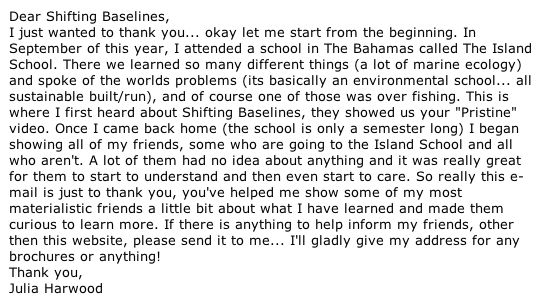March 01, 2005
3/1 - Metrics? We don't need no schtinking metrics
How do you quantify "the metrics" of the e-mail below which I received yesterday? Here at SB we're not real big on believing in metrics (I've heard too many stories of Hollywood movies that "tested through the roof" then flopped). Instead, we believe in believing (and we love hearing the number crunchers groan over that statement). We believe there are lots of good people out there who come across the media we produce (slide shows, PSAs, short films, lenticulars, etc.), are inspired by them, and put them to good use in helping to communicate the issues in the oceans. Yet you just can't quantify that process.
Yes, it's an old fashioned way of thinking (maybe even used to be the prevailing way of thinking in the environmental world before the advent of corporate concepts like "return on investment") but we actually believe in people more than numbers.

The Age Old Question: How do you quantify "inspiration" like this for the bean counters?
Posted by Randy Olson at March 1, 2005 03:20 AMThe metrics of most NGOs are directed first and foremost to their membership. As a result, they can't take chances. They can't risk alienating the folks who pay the bills (for most NGOs its their members who bring in the bulk of the money). They ask, "What can we do to increase membership?" That's a major metric - $$$$$ coming in. Of course, there are many other metrics like how many publications get produced, how many news stories appear, even things like how many congressmen sign on to a bill.
But when the problems are really large - like ocean decline - it's important that somebody try to inspire, even with small steps. Even if it's one person at a time. It it's done right, if it can be sustained, then there's a good chance "one person at a time" can become a mass media event or campaign - eventually. There is risk involved - big risk - but the payoff can be huge. Somebody has to take some risks. Otherwise the gains will be too small. The evidence? The oceans continue to get hammered.
Posted by: Interested pary at March 2, 2005 08:34 PM